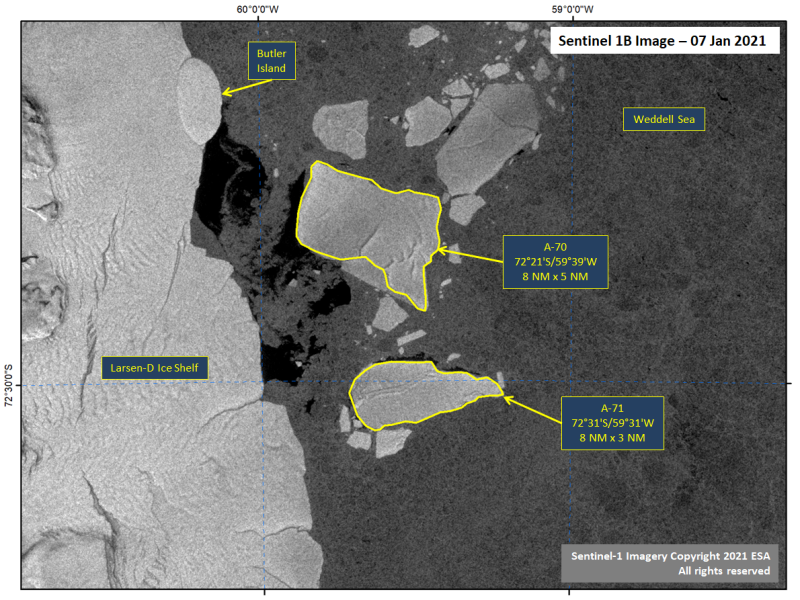Icebergs A-70 and A-71 Calve from Larsen-D Ice Shelf in the Weddell Sea
By LT Falon M. Essary, USN
NIC.PAO@noaa.gov
U.S. National Ice Center
January 08, 2021
Suitland, MD — The Larsen-D Ice Shelf calved several icebergs in a calving event, two of which are large enough to be named. The breakup occurred in early November 2020, but until now it had been impossible to confirm whether these were icebergs large enough to be named or extremely old sea ice that had fasted to the ice shelf. Recent imagery showing surface topography typical of icebergs has allowed us to confirm these are indeed icebergs. The new iceberg A-70 is located at 72° 21' South, 59° 39' West and measures 8 nautical miles on its longest axis and 5 nautical miles on its widest axis. The new iceberg A-71 is located at 72° 31' South, 59° 31' West and measures 8 nautical miles on its longest axis and 3 nautical miles on its widest axis.
A-70 and A-71 were first spotted by USNIC Ice Analyst Michael Lowe and confirmed by USNIC Ice Analyst Chris Readinger using the Sentinel-1A image shown below.
Iceberg names are derived from the Antarctic quadrant in which they were originally sighted. The quadrants are divided counter-clockwise in the following manner:
A = 0-90W (Bellingshausen/Weddell Sea)
B = 90W-180 (Amundsen/Eastern Ross Sea)
C = 180-90E (Western Ross Sea/Wilkesland)
D = 90E-0 (Amery/Eastern Weddell Sea)
When first sighted, an iceberg’s point of origin is documented by the USNIC. The letter of the quadrant, along with a sequential number, is assigned to the iceberg. For example, C-19 is sequentially the 19th iceberg tracked by the USNIC in Antarctica between 180-90E (Quadrant C). Icebergs with letter suffixes have calved from already named icebergs, where the letters are added in sequential order. For example, C-19D, is the 4th iceberg to calve off the original C-19 iceberg.
The National Ice Center is a tri-agency operational center represented by the United States Navy (Department of Defense), the National Oceanic and Atmospheric Administration (Department of Commerce), and the United States Coast Guard (Department of Homeland Security). The National Ice Center mission is to provide the highest quality strategic and tactical ice services tailored to meet the operational requirements of U.S. national interests and to provide specialized meteorological and oceanographic services to United States government agencies.

For more information, please contact:
National Ice Center
Command Duty Officer
Voice: (301) 943-6977
E-mail: nic.cdo@noaa.gov
Twitter: @usnatice
Facebook: @usnatice
The U.S. National Ice Center is a tri-agency center operated by the Navy, NOAA, and Coast Guard and provides global to tactical scale ice and snow products, ice forecasting, and related environmental intelligence services for the United States government.